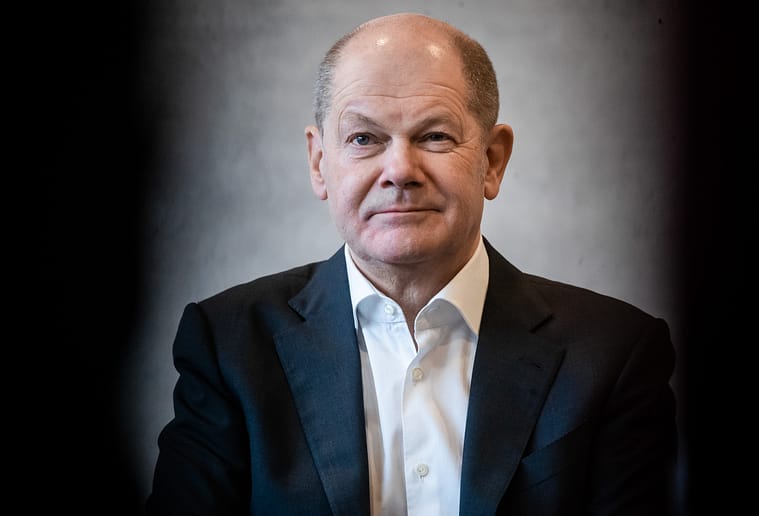20.12.2024
War in Ukraine, Taurus Missiles, Russian Espionage: Is Germany in Trouble?
Interview
8 mars 2024

Germany, which has become Ukraine’s second biggest military supporter, has seen its foreign policy shaken in recent weeks, between Chancellor Olaf Scholz’s refusal to deliver the long-range Taurus missiles desired by Kiev and Russian spying on a confidential conversation between German officers. How have these recent episodes weakened Germany’s position on the conflict? What are the differences between Paris and Berlin? Interview with Jacques-Pierre Gougeon, Senior Research Fellow at IRIS and author of « L’Allemagne, un enjeu pour l’Europe » (Éditions Eyrolles, 2024).
How can we assess Germany’s commitment and assistance in defending Ukraine since the start of the war?
Although Germany may have been somewhat hesitant at the start of the war in Ukraine in terms of the nature and scale of its support, despite a firm speech by Chancellor Olaf Scholz to the Federal Parliament on 27 February 2022 announcing « a change of era » and providing for the creation of a special fund to equip the German army, Berlin is now the second largest contributor to Ukrainian military aid, to the tune of €17 billion, behind the United States and well ahead of France. After this initial period of hesitation, which was largely due to internal debates within the coalition and the Chancellor’s party, the Social Democratic Party, one wing of which was and still is marked by a pacifist tradition, things moved quite quickly with the decision on 26 April 2022 to deliver heavy weapons to Ukraine, an action that was subsequently supplemented by the delivery of several series of weapons including the powerful Leopard 2 tanks and anti-aircraft defence systems. Germany is currently refusing to supply Taurus missiles with a range of over 500km for fear that they could reach Russian territory, and even Moscow from Ukraine’s north-eastern border. In the eyes of German leaders, this situation would lead to escalation, or even cobelligerence. Moreover, according to a recent poll published by Der Spiegel on 2 March 2024, 56% of Germans are against the delivery of this last category of missiles. It is important to realise that these various steps, however incomplete they may appear to some, mark the end of two taboos in Germany. The first of these is the military dimension of foreign policy, which although sometimes difficult to accept, as was the case in 1999 with Germany’s involvement in Kosovo, always with a guilty conscience and after violent debate, is now fully accepted. Secondly, the need to deliver heavy weapons to a country at war where Germany has been active in the past is also recognised, depending on the circumstances and on a case-by-case basis.
A conversation between high-ranking German army officers on the subject of Taurus missiles was intercepted and broadcast in Russia. What political and geopolitical repercussions might this case of Russian espionage in Germany have? Why have these interceptions put Olaf Scholz in an uncomfortable position?
First of all, this espionage affair is serious in terms of its form. In fact, it shows an unprofessional practice on the part of senior officers in the federal army, who use the public Webex platform for their ultra-sensitive conversations when the normal procedure would at least be to use an encrypted line. Particularly on the part of the Commander-in-Chief of the Air Force, this may even be worrying and may foreshadow other « leaks ». Then there is the substance, because it can be inferred that, contrary to the Chancellor’s public assertions, some officials are questioning the use by Ukrainian forces of Taurus missiles, albeit with political validation, and their ability to destroy the Kerch Bridge linking Russia to the Crimean peninsula. In both cases, this poses a serious problem of confidence and credibility, both internally and with Germany’s allies.
In what way has the war in Ukraine crystallised the differences between France and Germany over the last few weeks?
The recent controversy surrounding French President Emmanuel Macron’s remarks about a possible increase in the degree of strategic ambiguity with regard to Russia by envisaging – even if only in response to a journalist’s question – the possible use of « ground troops » reveals the absence of a strategic consensus on security between Germany and France, in addition to the Chancellor’s displeasure at feeling cheated after expressing his disagreement with this approach at the meeting of Heads of State and Government. What’s more, Olaf Scholz can hardly commit himself on such a subject without referring to the Federal Parliament, the federal army being « an army of Parliament ». Some of the German press reacted strongly to the French President’s remarks, with the Süddeutsche Zeitung telling Emmanuel Macron the day after the Paris meeting that it would be better to « think before you speak ». This head-on opposition also reveals a German rejection of a French assumption. France, the only nuclear power in the European Union after the departure of Great Britain, sees itself as having a form of leadership on this issue, which Germany rejects. More generally, this Franco-German dissonance is the culmination of a series of disagreements on key issues such as the reform of the electricity market and the reform of the Stability Pact, on which a compromise has finally been reached, albeit one that is considered shaky by specialists on both subjects. Military cooperation remains unsatisfactory, even if the future aircraft project is making slow progress after being bogged down for a long time, a fate that still hangs over the joint tank. As for free trade, and more specifically the agreements signed by the European Commission in this area, such as Mercosur, the disagreement remains profound.
Translated by Deepl.